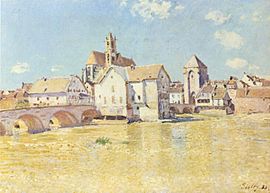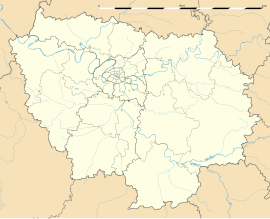Moret-sur-Loing | |
|---|---|
Part of Moret-Loing-et-Orvanne | |
 Moret-sur-Loing, Alfred Sisley, 1888 | |
| Coordinates: 48°22′28″N 2°48′54″E / 48.3744°N 2.815°E | |
| Country | France |
| Region | Île-de-France |
| Department | Seine-et-Marne |
| Arrondissement | Fontainebleau |
| Canton | Montereau-Fault-Yonne |
| Commune | Moret-Loing-et-Orvanne |
| Area 1 | 4.94 km2 (1.91 sq mi) |
| Population (2019)[1] | 4,206 |
| • Density | 850/km2 (2,200/sq mi) |
| Time zone | UTC+01:00 (CET) |
| • Summer (DST) | UTC+02:00 (CEST) |
| Postal code | 77250 |
| Elevation | 45–98 m (148–322 ft) |
| 1 French Land Register data, which excludes lakes, ponds, glaciers > 1 km2 (0.386 sq mi or 247 acres) and river estuaries. | |
Moret-sur-Loing (French pronunciation: [mɔʁɛ syʁ lwɛ̃], literally Moret on Loing) is a former commune in the Seine-et-Marne department located at the Île-de-France region in north-central France. It is situated along the confluence of rivers Loing and Seine. Moret–Veneux-les-Sablons station has rail connections to Montargis, Melun, Montereau-Fault-Yonne, Laroche-Migennes and Paris.
On 1 January 2015, Moret-sur-Loing and Écuelles have merged becoming one commune called Orvanne. It merged once again into the new commune called Moret-Loing-et-Orvanne on 1 January 2016.[2]
The town was a source of inspiration for Monet, Renoir and Sisley.
- ^ Téléchargement du fichier d'ensemble des populations légales en 2019, INSEE
- ^ Arrêté préfectoral 29 October 2015 (in French)



